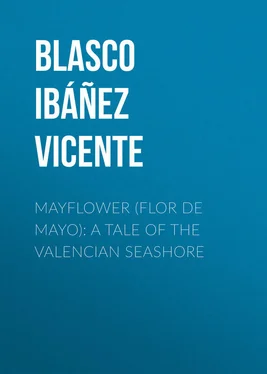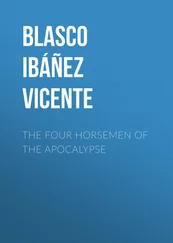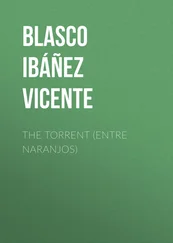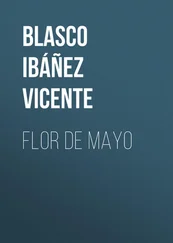Vicente Blasco Ibáñez - Mayflower (Flor de mayo) - A Tale of the Valencian Seashore
Здесь есть возможность читать онлайн «Vicente Blasco Ibáñez - Mayflower (Flor de mayo) - A Tale of the Valencian Seashore» — ознакомительный отрывок электронной книги совершенно бесплатно, а после прочтения отрывка купить полную версию. В некоторых случаях можно слушать аудио, скачать через торрент в формате fb2 и присутствует краткое содержание. Жанр: foreign_antique, foreign_prose, на английском языке. Описание произведения, (предисловие) а так же отзывы посетителей доступны на портале библиотеки ЛибКат.
- Название:Mayflower (Flor de mayo): A Tale of the Valencian Seashore
- Автор:
- Жанр:
- Год:неизвестен
- ISBN:нет данных
- Рейтинг книги:3 / 5. Голосов: 1
-
Избранное:Добавить в избранное
- Отзывы:
-
Ваша оценка:
- 60
- 1
- 2
- 3
- 4
- 5
Mayflower (Flor de mayo): A Tale of the Valencian Seashore: краткое содержание, описание и аннотация
Предлагаем к чтению аннотацию, описание, краткое содержание или предисловие (зависит от того, что написал сам автор книги «Mayflower (Flor de mayo): A Tale of the Valencian Seashore»). Если вы не нашли необходимую информацию о книге — напишите в комментариях, мы постараемся отыскать её.
Mayflower (Flor de mayo): A Tale of the Valencian Seashore — читать онлайн ознакомительный отрывок
Ниже представлен текст книги, разбитый по страницам. Система сохранения места последней прочитанной страницы, позволяет с удобством читать онлайн бесплатно книгу «Mayflower (Flor de mayo): A Tale of the Valencian Seashore», без необходимости каждый раз заново искать на чём Вы остановились. Поставьте закладку, и сможете в любой момент перейти на страницу, на которой закончили чтение.
Интервал:
Закладка:
Sometimes she could contain her happiness no longer; and to view her good fortune in perspective, as it were, she would walk down to the fringe of the surf, and look back with welling eyes at the hen coop, the open-air kitchen, the sonorous pig-pen, and finally the boat itself, its bow and stern projecting from a maze of fences, cane-work and thatch, and painted a clean dazzling white like some bark of dream-land tossed by a hurricane into a barnyard.
Not that life did not still have its hardships for her. She got little sleep. To begin with, she had to be up at sunrise every morning, and oftentimes, after midnight, when boats would make shore late or be leaving before dawn, the fishermen would start banging on her door and she would have to get up and serve them. These early morning sprees were the ones that made most money, though they caused her most uneasiness on the whole. She knew whom she was dealing with. Ashore for a few hours after a week at sea, those men wanted all the pleasures of land crowded into minutes of pure joy. They lighted on wine like flies on honey. If the older men soon fell asleep with their pipes dead between their teeth, not so the sturdier boys, aflame from the privations and abstinence of life at sea. They would look at siñá Tona in ways that would bring gestures of annoyance from her and make her wonder how she could fight off the brutal caresses of those Tritons in striped shirts.
She had never been a beauty; but her trace of fleshiness, her big black eyes that seemed to brighten a clean brownish countenance, and especially the light wrapper she would hurriedly throw on to attend to her nocturnal patronage, lent her charm in the eyes of those healthy youths who laid their courses toward the Valencian shore with joyous anticipation of a sight of siñá Tona.
But Tona was a woman of brain and brawn, and she knew how to handle those fellows. She bestowed no favors. When their words were over-bold she would answer with disdain. To nudges she replied with cuffs, and once when a sailor seized her suddenly from behind, she laid him flat with a well placed kick, tough as iron and sturdy as a main-mast though he was.
She would have no love affairs, even if other women did! A man would never touch the end of her little finger, no siree! The idea, besides! A mother of two children, little angels, sleeping there behind one thickness of boards – you could hear them breathe, even – and she alone in the world to support them!
The future of the boys was beginning to cause the mother hours of thought They had been growing up there, on the beach, like two baby gulls, nesting in the shade of the grounded boats when the sun burned hotly, or hunting conchas and periwinkles on the shore uncovered at low tide, their brown chubby legs sinking deep into the masses of seaweed. The older child, Pascualet, was the living likeness of his father, stocky, full-bellied, moon-faced. He looked like a seminary student specializing on the Refectory, and already the fishermen had dubbed him "the Rector," a nickname that was to stick to him for life. He was eight years older than Antonio, a lean, nervous, domineering little fellow who had Tona's eyes.
Pascualet became a real mother to his younger brother. While siñá Tona was busy with the tavern, during the earliest days which had been the hard ones, the good-natured boy had carried the baby around with the tenderness of a nurse and had played with the young torments of the water front with that snarling squirming brat in his arms, who would bite and scratch when anything did not suit him. At night, in the cramped "stateroom" of the tavern-boat, "Tonet" would stretch out full length in the most comfortable place, letting his fat brother curl up in a corner where he might, provided he did not disturb the little devil, who in spite of his smallness ruled his elder brother like a tyrant.
The two boys would fall asleep to the lullaby of the waves which on days of spring-tide reached almost to the tavern; and in winter, when the cold wind would try to make its way through the seams in the old boat's walls, they would snuggle close together under the same coverlet. Some nights they would be wakened by the uproar from the drunken sailors in the tavern, and hear the angry words of their mother, or the slaps she would rain on impudent cheeks. More than once the frail partition of their bedroom had threatened to give way as some staggering body fell against it. But then they would go to sleep again, with the carefree innocence of children, with no suspicions, and without alarm.
Siñá Tona had an unjust weakness for her younger son. In the first days of her widowhood, when she saw the two little heads sleeping side by side in the narrow cabin, resting perhaps on the very timbers that had crushed their father's skull, she had felt an equal tenderness for them both, as though the deadly bark were to destroy them as it had killed Pascualo. But when prosperity came, and the memory of the tragedy grew dim with the years, siñá Tona showed unmistakable fondness for Tonet, a child of feline shrewdness, who treated everybody with imperious petulance, but for his mother always had the speculative fondness of a sly cat.
What a joy Tonet was for her, a beach vagabond at seven, spending the whole day away from home with one gang or another, and coming back at night with his clothes soaked and torn, and his pockets full of sand! The older boy, meanwhile, now that his brother had been weaned from him, would be in the tavern, washing dishes, waiting on customers, feeding the hens, or watching, with grave responsibility written on his features, the two frying-pans that were crackling on the stoves.
The mother, sometimes, on suddenly waking from a doze behind the counter and finding Pascualet in front of her, would start with violent surprise. Pascualo, for all the world! Just as she had known him as a boy, before their marriage, when he was "cat" on a fishing vessel! The same round jolly face, the same stout square-shouldered body, the same stubby sturdy legs, the same expression of an honest simpleton with a gift for plodding work that stamped him in advance as a steady reliable chap, an hombre de bien . And the same inside, as well! Good-natured, too good-natured if anything, and bashful! But a bull-dog when it came to hanging on to money; and a mad fondness for the sea, prolific mother of men of courage, strong enough and brave enough to earn their living from her bosom!
By the time he was thirteen, the tavern had become quite uncongenial to "the Rector," as he gave to understand with a word dropped here and there, or with one of those occasional half-finished and incoherent sentences, which were all that ever came out of that hard head of his. He had not been born to the tavern business! Something altogether too tame for him! That might do for Tonet, who didn't like real work overwell. As for himself, he was a man of muscle, and he loved the sea. No, he must be a fisherman like his father!
When siñá Tona heard such remarks the terrifying thought of the catastrophe of that Lenten Tuesday would come back to her mind. But the boy held his ground. Things like that didn't happen every day. And since he felt a hankering for it, the profession of his father and his grandfather was good enough for him; and tio Borrasca, an old skipper who had been a great friend of tio Pascualo, thought so too.
One year when the drag-net season came around, the pesca del bòu , as the Valencians say, where two boats worked in team, Pascualet shipped with tio Borrasca as "cat," gato de barca , for his keep, and all he might make, in addition, from the cabets , the small fry, shrimp, sea-horses and so on, that came up in the nets from the bottom along with the big fish.
Читать дальшеИнтервал:
Закладка:
Похожие книги на «Mayflower (Flor de mayo): A Tale of the Valencian Seashore»
Представляем Вашему вниманию похожие книги на «Mayflower (Flor de mayo): A Tale of the Valencian Seashore» списком для выбора. Мы отобрали схожую по названию и смыслу литературу в надежде предоставить читателям больше вариантов отыскать новые, интересные, ещё непрочитанные произведения.
Обсуждение, отзывы о книге «Mayflower (Flor de mayo): A Tale of the Valencian Seashore» и просто собственные мнения читателей. Оставьте ваши комментарии, напишите, что Вы думаете о произведении, его смысле или главных героях. Укажите что конкретно понравилось, а что нет, и почему Вы так считаете.












